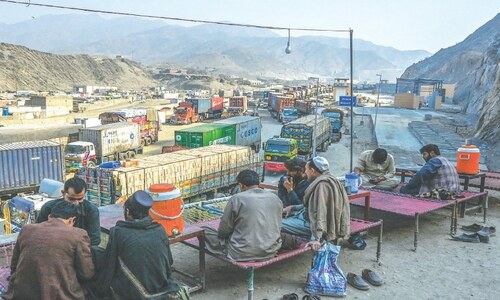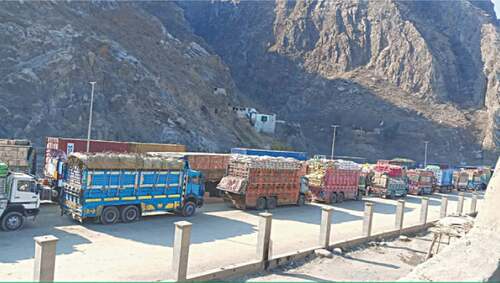The Pakistan-Afghanistan Torkham border, which was shut for 10 days due to the imposition of visa restrictions on truck drivers by Islamabad, was reopened on Tuesday, state-run Radio Pakistan reported.
The crossing was closed on January 13 after Pakistani officials at the crossing began asking for passports and visas from Afghan drivers under a new policy, prompting a reciprocal ban on Pakistani truckers by the Afghan Taliban authorities.
The border closure had come in the wake of Pakistan’s decision to start expelling more than a million undocumented foreigners, mostly Afghans, on Nov 1, amid a row over accusations that Kabul harbours militants that launch cross-border attacks.
Islamabad claimed that Afghan authorities had been conveyed the message on the imposition of the visa policy several times, but Kabul had failed to take any practical steps to adhere to international border crossing rules.
According to traders, the border closure resulted in significant economic losses for people in both countries, with daily losses estimated at around $100,000.
This was not the first time that Torkham was shut. The border crossing has been closed several times in recent months, including in September when it remained shut for nine days due to clashes between border forces.
In a report today, Radio Pakistan said the border crossing was reopened for “commercial consignments”. The decision was taken in a meeting between the Afghan consul general and Pakistani authorities in Peshawar.
Quoting Customs authorities, it said the first cargo vehicle had entered Pakistan through the Torkham while Afghan drivers of commercial vehicles had been given visa and passport relaxations till March 31.
“No cargo vehicle will be allowed entry into Pakistan without travelling documents from April 1,” Radio Pakistan added.
Separately, in a post on social media platform X, the JUI-F said the decision to relax visa requirements was taken on the request of Maulana Fazlur Rehman — who recently visited Kabul and discussed a range of issues, including bilateral trade, with the Afghan government.
Significant losses
Business leaders from both nations were united in opposing the border closures. Khan Jan Alokozai, the vice president of the Afghan Chamber of Commerce and Industry, earlier told Dawn that Pakistani and Afghan traders suffer losses of about $100,000 daily due to Torkham’s closure.
He alleged that Pakistan usually closes trade routes due to political reservations. “Afghans have almost stopped transit via Pakistan when Pakistan issued a new SRO (statutory regulatory order) nearly four months ago,” Alokozai added.
Meanwhile, Ziaul Haq Sardahi, coordinator of the Pak-Afghan Joint Chamber of Commerce and Industry (PAJCCI), said Pakistani exporters had urged the government to give Afghan drivers more time to get passports.
“Traders in both countries suffer millions of rupees of losses due to the closure of the Torkham border,” Sarhadi said, adding that several other crossings to Afghanistan also remain closed, including Chaman in Balochistan, Ghulam Khan Kelay in North Waziristan, Angoor Adda in South Waziristan, and Kharlachi in Kurram district.
Some 2,000 to 2,500 trucks on each side of the border remain stranded, he said, adding that the disruption has also affected Pakistan’s trade with Central Asia.














































Dear visitor, the comments section is undergoing an overhaul and will return soon.